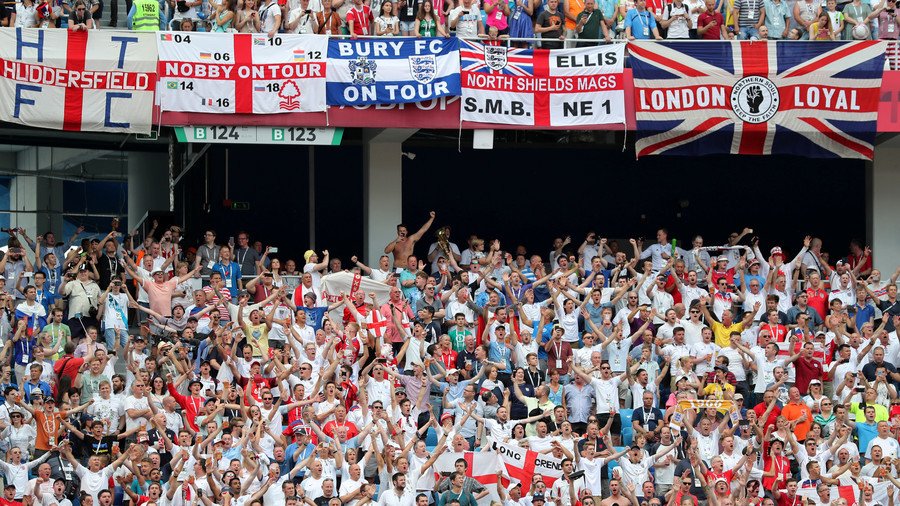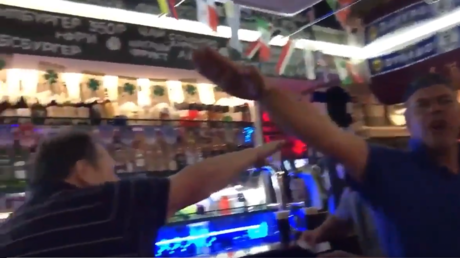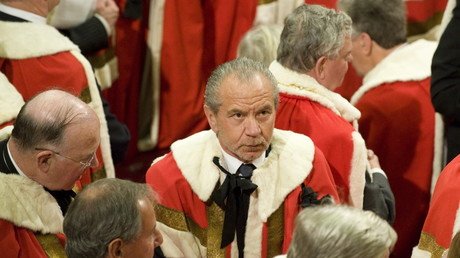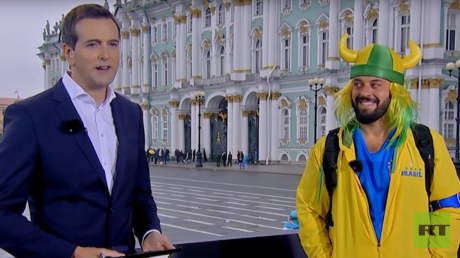World Cup exposes England not Russia as the country with a racism problem

England fans giving Nazi salutes in Russia’s Volgograd, Lord Alan Sugar posting racist tweets. Just how deep does England’s problem with racism run?
Baseless warnings about racism in Russia
Exposed as baseless during this World Cup has been the anti-Russia propaganda peddled by Western ideologues, particularly in the UK, when it comes to the security and safety of travelling fans.
In the lead up to the tournament the contents of a House of Commons Foreign Affairs Committee report was made public by the BBC. Consider the following paragraph: “Fans from BAME (Black, Asian, and minority ethnic) backgrounds and those who identify as LGBT (lesbian, gay, bisexual, and transgender) face additional risks of attack and persecution [in Russia].”
This exercise in scaremongering was undertaken by the usual crew of Russophobic cranks that colonises the UK political and media establishment, undertaken as part of a campaign to undermine the tournament and see it end in failure. In deterring fans from England in travelling to Russia to follow their team it worked, reflected in significantly lower number of tickets being sold in England than were sold for past World Cups in which the country’s national team were involved.
Alas, with the undoubted success of the tournament thus far, grudgingly acknowledged even by strident critics of Russia, England fans that made the mistake of believing this Russophobic guff have missed out and will be kicking themselves – even more so considering the hospitality the England fans who braved the journey have reported receiving in Russia, “praising a particularly warm reception from their hosts.”
Someone whose experience of Russia during the World Cup has been transformative is the London Telegraph’s Chief Sports Feature Writer, Oliver Brown.
In a recent piece - ‘Russia continues to surprise as street parties and rich history combine for an intoxicating fan experience’ - Brown writes: “Once, it was feared that this would be a hostile, disquieting World Cup, full of intrusive officialdom and scenes of England fans being hunted down by Russian ultras in balaclavas. Thus far, quite the opposite has transpired, with Russia, courtesy of its psychedelically-dressed tourists and its relaxation of its usual strict edicts, manufacturing an answer to the spirit of Woodstock."
With laudable reverence, the Telegraph journalist goes on to observe how “this World Cup has afforded some priceless windows, though, into the suffering and sacrifice woven into Russian history. Gareth Southgate [England manager] suggested as much when he led England to Volgograd, acknowledging that the visit proved that “some things are bigger than football ‒ and that’s good for us all”.
Here Oliver Brown is referring to the imposing and solemn memorials to the Battle of Stalingrad in WWII, which dominate what is now Volgograd, the city where England kicked off the group stage of their tournament against Tunisia on 18 June.
England fans and Lord Sugar
Ironically, given the attempt to paint Russia as a country suffused with violence and racism, thus far it has been England fans that have been exposed in this regard. The footage that emerged of a group of them in a bar in Volgograd throwing Nazi salutes and singing anti-Semitic songs could not have been more offensive, disrespectful and disgusting – even more so in Volgograd, what with the inordinate sacrifice that took place here on the part of the Russian people in the struggle to vanquish fascism.
But England’s cultural problem with racism is not one confined to a few drunken football louts of a type well known, or to the country’s benighted white working class as it clings on to the iconography and symbolism of the country’s colonial past in a time of brute austerity. No, England’s cultural problem with racism goes right to the top of society, evidenced in the controversy sparked by billionaire businessman Lord Sugar’s racist tweet concerning the Senegal team at the World Cup.
Lord Sugar’s case is especially noxious considering he has been one of the most strident critics of Labour leader Jeremy Corbyn when it comes to the serious allegations that antisemitism is rife among his supporters. They have been the subject of a party inquiry, said allegations, leading to suspensions, expulsions and resignations – up to and including that of former Mayor of London Ken Livingstone.
Calls for Sugar to be sacked from his primetime BBC television slot, as presenter of the UK version of the reality show The Apprentice, have yet to be heeded by the country’s state broadcaster. Instead, and to the chagrin of many, Sugar’s punishment for posting his racist tweet, which he subsequently deleted, amounts to being forced by BBC chiefs to complete an ‘unconscious bias’ course.
RT’s World Cup pundit and ex-England international, Stan Collymore, is in no doubt that the lack of decisive action by the BBC in the wake of this scandal opens the organisation up to the charge of double standards. In an interview with RT Collymore pondered whether the BBC’s reaction would have be the same if a black peer in the House of Lords tweeted something concerning Israel’s national football team that could be construed as anti-Semitic?
The answer is of course no it would not. In such a scenario said peer’s feet wouldn’t touch the ground. The BBC would instantly and decisively sack him, and echoing across the mainstream would be the call for him to be stripped of his peerage. And such a reaction would be justified, just as it is justified in the case of racist tweets being posted concerning the Senegal national football team.
Alas, though, when it comes to racism in the UK, some victims are deemed more worthy than others. Twas ever thus and ever thus will be.
Physician, heal thyself
In truth, and self evidently, if any country has a cultural problem with racism and bigotry it is England – a problem that has only been exacerbated by Brexit, rooted as it is in anti-migrant hostility, xenophobia, nativism and British colonial tropes. It is why being lectured to by the country’s establishment journalists and politicians on Russia’s problem with racism is akin to being told to sit up straight by the Hunchback of Notre Dame.
Physician, as the saying goes, heal thyself.
Think your friends would be interested? Share this story!
The statements, views and opinions expressed in this column are solely those of the author and do not necessarily represent those of RT.

















